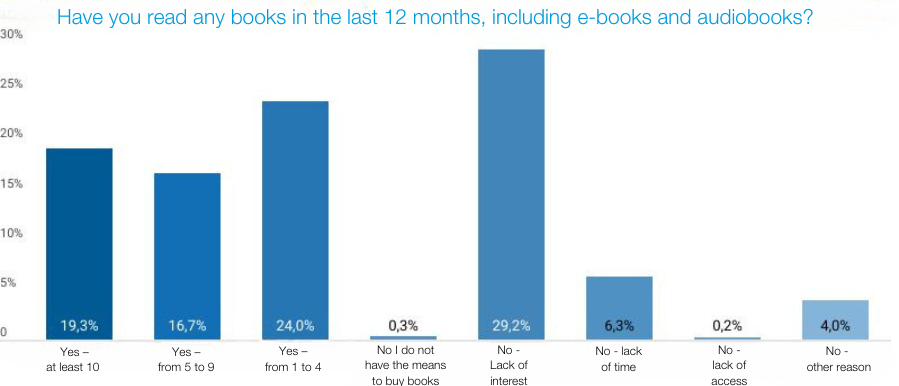Delving into the reading habits of the Belgian population over the past year, the Survey on Income and Living Conditions (SILC) conducted in 2022 by the Belgian statistical office Statbel provides intriguing insights.
The survey targeted a representative sample of individuals aged 16 and above, scrutinising their engagement with books, whether in traditional, eBook, or audiobook formats.
A notable gender disparity emerged from the findings, underscoring that women outpaced men in literary consumption. Impressively, 67% of women delved into at least one book, compared to 52% of men.
Furthermore, women exhibited a voracious appetite for literature, with 24% having read a noteworthy tally of at least ten books in the preceding year, outshining their male counterparts (15%). The overall reading figures for the entire population reflected a commendable 60%, with 19% having delved into a substantial ten books or more.

Credit: Statbel
While regional patterns remained inconclusive, age also proved to be a distinguishing factor. Individuals aged 75 and above demonstrated a proportionally lower likelihood of being avid readers compared to younger generations. Surprisingly, the 18- to 24-year-old demographic exhibited reading habits akin to the working-age populace.
Occupational distinctions also played a role, with self-employed individuals citing time constraints as a primary obstacle to reading (14% compared to 6% for the general population). Paradoxically, both the self-employed and employees surpassed the unemployed, pensioners, and inactive individuals in terms of reading frequency.
Notably, 57% of pensioners engaged in reading, slightly trailing behind workers at 63%. However, pensioners who did read were avid readers, with 24% having read at least ten books the previous year.
Education emerged as a powerful influencer on reading habits: 78% of people aged 16 and over with a higher education qualification have read at least one book, compared with 39% of people with at most a lower secondary education qualification.
Lack of interest
Exploring the reasons why people had not read a book in the preceding 12 months, lack of interest emerged as the predominant factor, cited by 29% of the Belgian population. This figure escalated to 47% for those with less than a lower secondary education qualification and 41% for the unemployed.
In contrast, the economic barrier of insufficient funds to purchase books was only articulated by 0.3% of respondents. Strikingly, among those at risk of poverty or social exclusion, nearly half had indulged in reading despite financial constraints.

